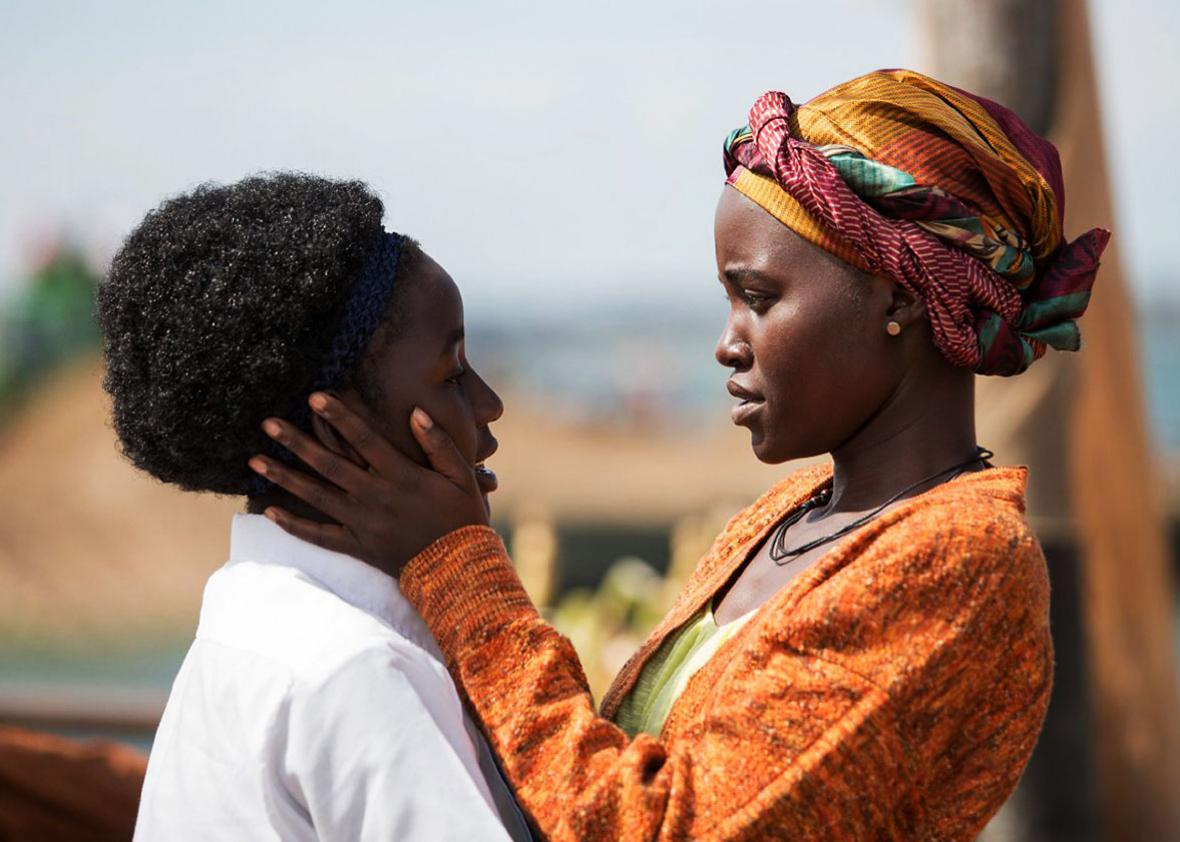Queen of Katwe, a Disney family production which tells the true story of the Ugandan teenage chess champion Phiona Mutesi, has the rare distinction of being a film set in Africa whose story doesn’t center around war or famine. That fact alone lends Mira Nair’s film, clearly aimed at a broad swath of family audiences, a winning buoyancy. Queen of Katwe, featuring three powerful central performances from Madina Nalwanga as the young prodigy, Lupita Nyong’o as her mother, and David Oyelowo as her chess coach, is adapted by William Wheeler from a book about Mutesi’s unlikely ascent in the chess ranks by sportswriter Tim Crothers. It has the structure of a not-so-original sports picture, with repeated cycles of practice, failure, and rededication to practice spiraling up toward eventual (and, this being a biopic, inevitable) triumph.
But Queen of Katwe’s originality comes not in its story but in its setting, explored by Nair with her usual skill at establishing a sense of place. For decades, Nair’s films, like Salaam Bombay!, Mississippi Masala, Monsoon Wedding, and The Namesake have taken place in milieus whose socioeconomic, ethnic, and cultural specificity have been craftily evoked, and in Queen of Katwe it’s Katwe—the poor Kampala suburb of which the determined Phiona eventually becomes the symbolic “queen”—that’s the real star. Nair has decades’ worth of familiarity with the place, having lived in Uganda for years after first getting to know the area while researching Mississippi Masala, and her camera feels at its freest and most energetic when exploring the town’s bustling red-dirt streets.
Katwe is a tough neighborhood, yes, but Phiona’s family gets by in its own hardscrabble way. Harriet (Nyong’o), Phiona’s widowed mother, wants to pull Phiona and her younger brother Brian (Martin Kabanza) out of their after-school chess program so they can help bring in money for the family, but the program’s founder, aspiring civil engineer–turned–chess-tutor Robert Katende (Oyelowo), persuades her to let the children stay, suggesting that the girl in particular shows signs of real talent. Soon the even-tempered and tough-to-faze Phiona is easily beating boys in her own age group; as one tournament judge approvingly observes, “such aggressiveness in a girl is a treasure.” (That’s a sentiment too long missing from Disney movies.)
The 16-year-old Madina Nalwanga—who, like the actors who play her siblings, is a real-life native of Katwe—has an aura of stubborn composure that makes her seem perfectly credible as a formidable chess player who can see eight moves ahead of her opponent. As her skill level and renown on the chess circuit grow, Phiona travels with her team, becoming Uganda’s junior champion at age 11 and eventually competing against adults at the World Chess Olympiad in Siberia. The segments of the movie that take us away from Katwe and pit Phiona and her small-town team against cartoonishly snobbish big-city opponents are the film’s least enjoyable and most overwritten.
More effective in accentuating the tensions between cosmopolitanism and traditional values is a subplot involving Phiona’s older sister (Taryn “Kay” Kyaze), whose infatuation with a glitzy, citified youth (Maurice Kirya) has her old-fashioned mother clucking with disapproval. The preternaturally gorgeous Nyong’o (swathed in bright African prints by costume designer Mobolaji Dawodu) seems awfully fresh-faced and lovely to have lived the life of loss and grueling toil her character is supposed to have, but in her first live-action role since 12 Years a Slave, she again seizes hold of the screen during every one of her too-brief moments on it. Oyelowo, who played Martin Luther King, Jr. in Selma, brings some of that same centered soulfulness to the role of Coach Katende. Though they’re by far the highest-wattage Hollywood stars in sight, Oyelowo and Nyong’o both give generously modest performances, allowing the naturalistic style of the young Ugandan actors to shine.
You might justly accuse Queen of Katwe of glossing over some of the uglier facts of African poverty in the service of a feel-good narrative about hard work and believing in your dreams—there’s no mention, for example, of the fact the real-life Phiona lost her father to AIDS at age 3. But you know what? The existence of a female teenage chess champion who grew up in a Ugandan slum legitimately is something to feel good about. If you want to take your kids to an uplifting and quietly feminist sports movie that will also give them a glimpse of a part of the planet that too often gets presented as a vale of tears worthy only of the Western world’s condescending pity, you ought to show them Queen of Katwe. In the film’s exuberant final scene, Phiona returns home, trophy in hand, to be welcomed by an impromptu parade that turns into an all-ages dance party in the street. It’s a reminder that there are some things—family love, hometown pride, hard work, achievement, recognition—that feel the same the whole world over.
